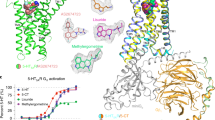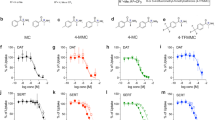Abstract
A RECENT communication by Vane et al. entitled “Tryptamine Receptors in the Central Nervous System”1 concluded, on the basis of indirect evidence, that the receptors for tryptamine and for serotonin (5-hydroxytryptamine) were the same. Because the authors neglected to mention some earlier evidence of a more direct kind which showed clearly that certain receptors for these two substances were different, we wish to direct attention to this contrary evidence before the conclusion about their identity becomes widespread.
This is a preview of subscription content, access via your institution
Access options
Subscribe to this journal
Receive 51 print issues and online access
$199.00 per year
only $3.90 per issue
Buy this article
- Purchase on SpringerLink
- Instant access to full article PDF
Prices may be subject to local taxes which are calculated during checkout
Similar content being viewed by others
References
Vane, J. R., Collier, H. O. J., Corne, S. J., Marley, E., and Bradley, P. B., Nature, 191, 1068 (1961).
Woolley, D. W., and Shaw, E., J. Pharm. Exp. Therap., 121, 13 (1957).
Woolley, D. W., and Shaw, E., J. Biol. Chem., 203, 69 (1953).
Author information
Authors and Affiliations
Rights and permissions
About this article
Cite this article
WOOLLEY, D., SHAW, E. Tryptamine and Serotonin Receptors. Nature 194, 486 (1962). https://doi.org/10.1038/194486a0
Issue date:
DOI: https://doi.org/10.1038/194486a0
This article is cited by
-
The action of smooth muscle stimulators studied by correlation analysis
Bulletin of Experimental Biology and Medicine (1976)
-
Orientierende Übersicht
Ergebnisse der Physiologie Biologischen Chemie und Experimentellen Pharmakologie (1966)



